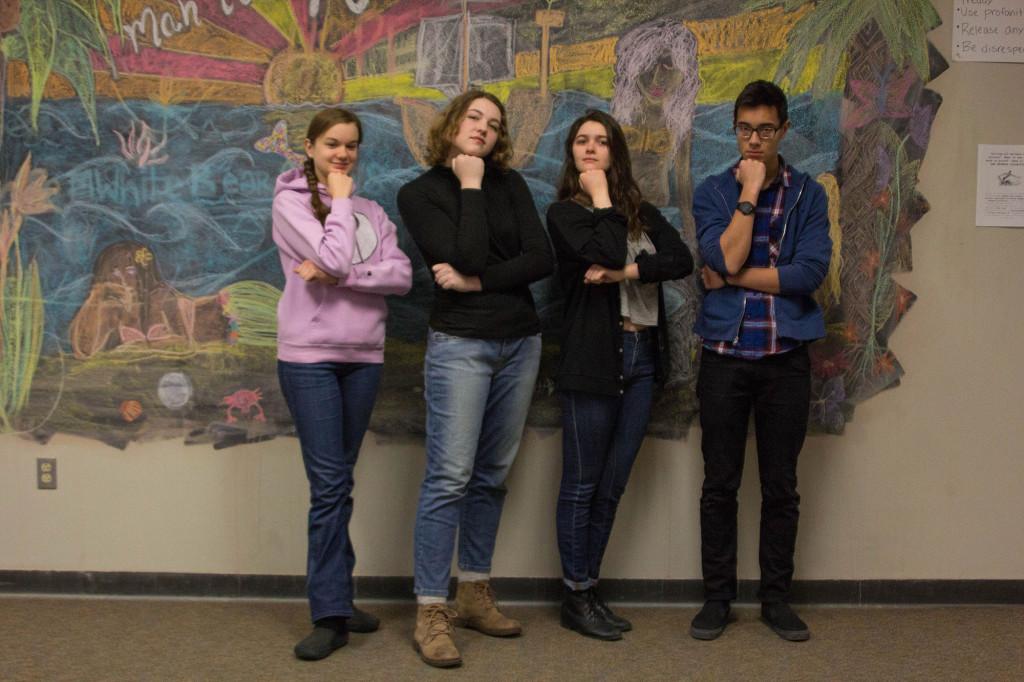Bound to
seniors secure college admission through early decision
At 11:14 a.m. on Dec. 14, the day of her ballet performance in the Lawrence Art Center’s production of “The Nutcracker,” senior Devany West clicked on a website that welcomed her to Massachusetts Institute of Technology’s class of 2018.
“I screamed and ran and hugged my parents,” West said.
As her ballet teacher cried and her friend danced and screamed, West reveled in the acceptance to her top choice school.
A select group of seniors wrote essays, collected letters of recommendation and submitted college applications by Nov. 1 to schools across the nation. Some of those who opted for early applications have already secured their plans for next fall.
“I wanted to know early on if I got in,” West said, “And also a lot of colleges have a higher acceptance rates if you apply early action or early decision.”
“Early action,” which is what MIT offers, is non-binding, meaning that students who are accepted early action have the option of attending a different institution for college. However, many schools offer an “early decision” option, in which admitted students are required to attend that school.
West, who plans on majoring in biological engineering, had no reservations about applying early to MIT after visiting the campus.
“… I absolutely loved the culture of it,” West said. “There’s lots of crazy, nerdy people there, which is sorta the sort of people I hang around with most of the time. People seem exuberant and happy and smart.”
Binding or non-binding, after her visit, West was prepared to commit.
“MIT was, you know, far and beyond my first choice,” West said. “Even if it had been binding I would’ve had no reservations about it.”
However, certain schools don’t offer this flexibility. Early decision applications require enrollment upon admission. Senior Tara Sacerdote applied early decision to Reed College.
“You have to be sure that’s what you want to do, and I was very sure,” Sacerdote said.
She received her notice of admission through an email featuring a video of other students getting accepted.
“It was just really exciting,” Sacerdote said. “For a while I was just shocked. I thought, ‘I’m moving to Portland in six months.’”
However, a secured future so early on has some drawbacks. Senioritis is real, and early acceptance isn’t a cure.
“Obviously you still need to work hard,” Sacerdote said, “but I really don’t want to go to school [or] get out of bed–I’ve already been accepted to college.”
While college applications are individual processes, they are certainly not faced alone. Along with taking Enrichment Resource teacher Teena Johnson’s collaborative college application class, Sacerdote has undergone the process alongside her friends.
“It is really exciting to see other people and what they are doing,” Sacerdote said. “I’ve known a lot of my classmates for six years, and I remember when we were really dumb and goofy kids.”
One of Sacerdote’s friends, senior Carl Palmquist, knew he wanted to attend the University of Pennsylvania’s Wharton School of Business. Palmquist submitted his binding early decision application and figured he’d wait to receive his admission decision before he begun writing other essays.
“Obviously I was very, very excited because mainly, I say this half jokingly… I hadn’t really gotten ahead on my applications and decided that I would do the rest after I found out what Penn said or not because I didn’t want to do all the work,” Palmquist said. “So, that was the biggest relief.”
On Monday, Dec. 16, during a scholars bowl practice, Palmquist knew he would be able to access information regarding his application. He debated waiting until he got home to check, but decided against it.
“I actually didn’t tell any of my friends that I was doing it,” Palmquist said, “Because I didn’t really want to have to explain to them if I happened to not get in.”
Staring at the screen of his iPhone, Palmquist was congratulated on his acceptance.
“I’m really happy to get in,” Palmquist said. “…I wasn’t sure by any means that I would be accepted or not, so it felt very, very good.”
The formidable commitment of early decision was magnified by Palmquist’s lack of familiarity with the campus.
“It’s a little worrying being like ‘oh I have no idea what this place even looks like,’” Palmquist said. “But I did talk to a lot of people who either attend there or at least visited and no one had anything negative to say about Philadelphia or the school.”
Students accepted early decision have substantially lowered stress after acceptance, but must choose to bind themselves to a school early on in the year.
Senior Sofie Frydman will also be heading to the East Coast in the fall. After years of visiting her sisters at Smith College in Northampton, Mass., Frydman is ready for her turn to attend.
One afternoon in December, her sister and mother informed her that admissions decisions had been released.
“I checked my email,” Frydman said, “And was super psyched because I did not really have a backup plan.”
Frydman is the only Free State student who early-decisioned to an all-women’s college.
“The school that I chose is all girls, and that is the only thing that really scares me,” Frydman said. “As far as education goes, I think I made the right decision.”
For the underclassmen who hope to be attending a top tier school in the near future, an important aspect of the application is an interview. However, they are not always formal, rigid experiences.
“[My interview] was at Panera,” West said. “It was just like an alumni from MIT, and she was just like ‘yeah, this is a cool school. You should apply.’ And I was like ‘I definitely am going to do that.’’
Despite the level of informality in some college interviews, a certain level of decorum should be maintained.
“Dress decently, show you care, be interested, like act interested in what the interviewer has to say,” Palmquist said.
Although senior year is filled with inevitable good-byes and departures for everyone, students accepted early already have a picture painted of the next few years.
Your donation will support the student journalists of Lawrence Free State High School. Your contribution will allow us to purchase equipment and cover our annual website hosting costs.








